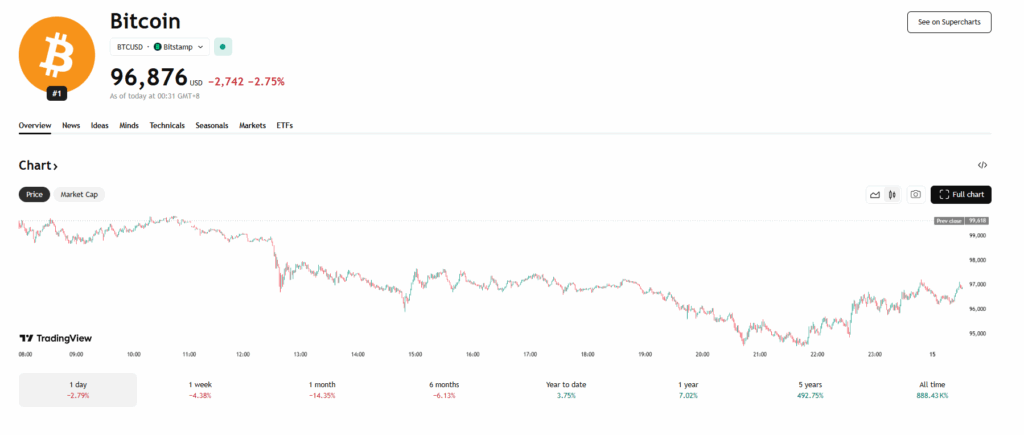- Bitcoin dipped below $95k as AI-linked tech stocks sold off, dragging broader risk markets with them.
- BigTech weakness and shrinking liquidity prompted investors to reduce exposure to both tech and crypto.
- Institutions may treat this decline as a buying opportunity rather than following past four-year BTC cycles.
Bitcoin slid under the $95,000 level on Friday, deepening its four-day decline as the broader market reacts to a sharp pullback in AI-related tech stocks. The world’s oldest cryptocurrency was last seen hovering near $96,293, down about 3.5% for the day. Although BTC briefly reclaimed $107,000 on Tuesday, the momentum didn’t hold, and selling pressure returned as investors reassessed their exposure across tech and digital assets.

Tech Weakness Pulls Crypto Down With It
Bitcoin’s price moves have increasingly mirrored those of BigTech stocks, largely because they attract overlapping investor groups. This week, several major tech names — including Meta, Alphabet, Intel, Nvidia, and Tesla — fell between 1% and 2% as renewed worries surfaced around Silicon Valley’s massive and rapidly rising AI expenditures. When institutional capital rotates out of tech, bitcoin frequently takes a hit as well.
Yat Siu, co-founder of Animoca Brands, explained that tighter liquidity across markets leads investors to “sell certain things off in order to deal with shortfalls or concerns,” highlighting a broader retraction in risk appetite.
Crypto Stocks Slide Alongside BTC
The weakness wasn’t limited to bitcoin itself. Crypto-linked equities also felt the pressure on Friday. Strategy (formerly MicroStrategy) slid 6%, while trading platforms Gemini Space Station and Bullish dipped around 2%. Coinbase fell roughly 1%, and mining firm Bitmine Immersion Technologies dropped another 3%. The coordinated pullback points to a macro-driven cooldown rather than a crypto-specific issue.

Could This Cycle Play Out Differently?
Siu also suggested that this market cycle may not mirror bitcoin’s classic four-year pattern. Historically, long-time BTC holders — often described as “religious” about the cycle — expect deep corrections after major rallies. But institutions, now a major force in the market, don’t typically invest based on that cycle at all. Instead, they view downturns through a different lens: opportunity.
Institutional buyers could step in during moments of fear, absorbing sell-offs instead of contributing to them. If that happens, bitcoin may not revisit extreme downside levels that previous cycles experienced, even with continued macro pressure from tech stocks and AI concerns.














